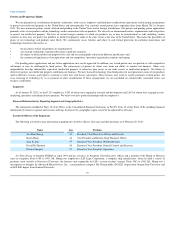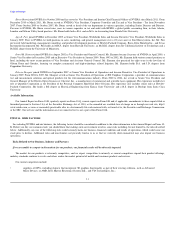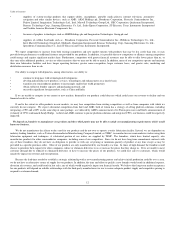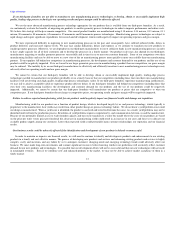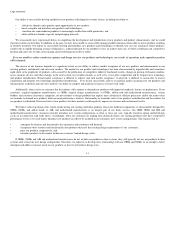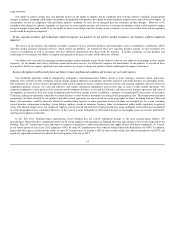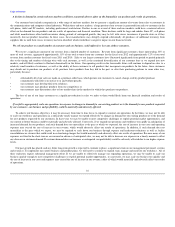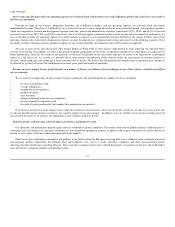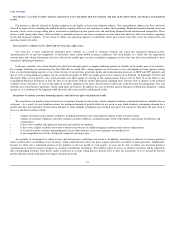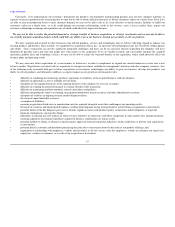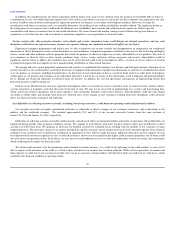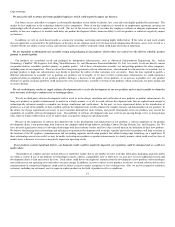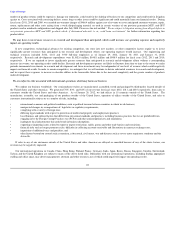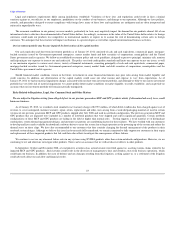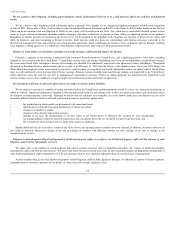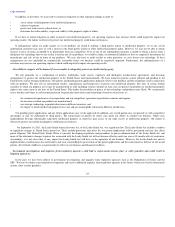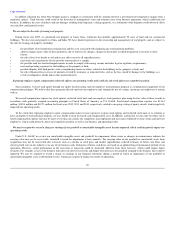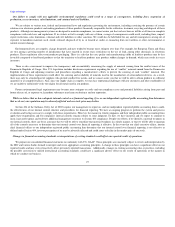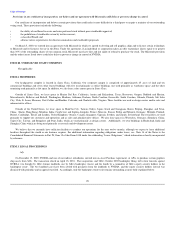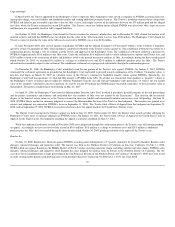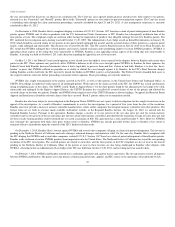NVIDIA 2012 Annual Report Download - page 21
Download and view the complete annual report
Please find page 21 of the 2012 NVIDIA annual report below. You can navigate through the pages in the report by either clicking on the pages listed below, or by using the keyword search tool below to find specific information within the annual report.
Table of Contents
In addition, the consideration for any future acquisition could be paid in cash, shares of our common stock, the issuance of convertible debt securities or
a combination of cash, convertible debt and common stock. If we make an investment in cash or use cash to pay for all or a portion of an acquisition, our cash
reserves would be reduced which could negatively impact the growth of our business or our ability to develop new products. However, if we pay the
consideration with shares of common stock, or convertible debentures, the holdings of our existing stockholders would be diluted. The significant decline in
the trading price of our common stock would make the dilution to our stockholders more extreme and could negatively impact our ability to pay the
consideration with shares of common stock or convertible debentures. We cannot forecast the number, timing or size of future strategic investments or
acquisitions, or the effect that any such investments or acquisitions might have on our operations or financial results.
System security risks, data protection breaches, cyber-attacks and systems integration issues could disrupt our internal operations, and any such
disruption could reduce our expected revenue, increase our expenses, damage our reputation and adversely affect our stock price.
Experienced computer programmers and hackers may be able to penetrate our security controls and misappropriate or compromise our confidential
information or that of third parties, create system disruptions or cause shutdowns. Computer programmers and hackers also may be able to develop and deploy
viruses, worms and other malicious software programs that attack our products or otherwise exploit any security vulnerabilities of our products. The costs to
us to eliminate or alleviate cyber or other security problems, bugs, viruses, worms, malicious software programs and security vulnerabilities could be
significant, and our efforts to address these problems may not be successful and could result in interruptions, delays, cessation of service and loss of existing
or potential customers that may impede our sales, manufacturing, distribution or other critical functions.
We manage and store various proprietary information and sensitive or confidential data relating to our business and third party business. Breaches of our
security measures or the accidental loss, inadvertent disclosure or unapproved dissemination of proprietary information or sensitive or confidential data about
us or our partners or customers, including the potential loss or disclosure of such information or data as a result of fraud, trickery or other forms of deception,
could expose us, our partners and customers or the individuals affected to a risk of loss or misuse of this information, result in litigation and potential liability
for us, damage our brand and reputation or otherwise harm our business. In addition, the cost and operational consequences of implementing further data
protection measures could be significant.
Portions of our IT infrastructure also may experience interruptions, delays or cessations of service or produce errors in connection with systemic failures,
systems integration or migration work that takes place from time to time. We may not be successful in implementing new systems and transitioning data,
which could cause business disruptions and be more expensive, time consuming, disruptive and resource-intensive. Such disruptions could adversely impact
our ability to fulfill orders and interrupt other processes. Delayed sales, lower margins or lost customers resulting from these disruptions could adversely
affect, our financial results, stock price and reputation.
Any difficulties in collecting accounts receivable, including from foreign customers, could harm our operating results and financial condition.
Our accounts receivable are highly concentrated and make us vulnerable to adverse changes in our customers' businesses, and to downturns in the
industry and the worldwide economy. We recorded approximately 20% and 11% of our accounts receivable balance from the same customer at
January 29, 2012 and January 30, 2011, respectively.
Difficulties in collecting accounts receivable could materially and adversely affect our financial condition and results of operations. These difficulties are
heightened during periods when economic conditions worsen. We continue to work directly with more foreign customers and it may be difficult to collect
accounts receivable from them. We maintain an allowance for doubtful accounts for estimated losses resulting from the inability of our customers to make
required payments. This allowance consists of an amount identified for specific customers and an amount based on overall estimated exposure. If the financial
condition of our customers were to deteriorate, resulting in an impairment in their ability to make payments, additional allowances may be required, we may
be required to defer revenue recognition on sales to affected customers, and we may be required to pay higher credit insurance premiums, any of which could
adversely affect our operating results. In the future, we may have to record additional reserves or write-offs and/or defer revenue on certain sales transactions
which could negatively impact our financial results.
We obtain credit insurance over the purchasing credit extended to certain customers. As a result of the tightening of the credit markets, we may not be
able to acquire credit insurance on the credit we extend to these customers or in amounts that we deem sufficient. While we have procedures to monitor and
limit exposure to credit risk on our accounts receivable, there can be no assurance such procedures will effectively limit our credit risk or avoid losses, which
could harm our financial condition or operating results.
20


